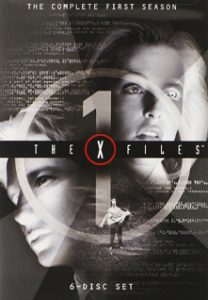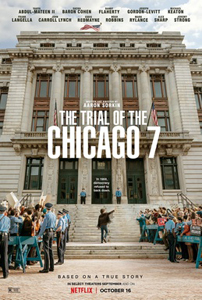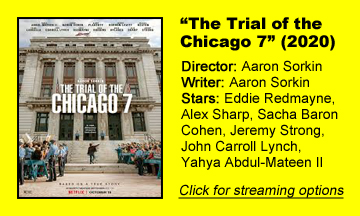I’m not a huge connoisseur of courtroom dramas about wrongfully accused defendants, similar to why I don’t like war movies. I already know war is hell, and that the U.S. justice system is rotted by corruption. When convinced by my friends that I have to see a movie – such as Netflix’s “The Trial of the Chicago 7” – I just hope there’s comic relief and other layers amid the messaging about how horribly unjust everything is.
Sorkin brings his A-game
Thankfully, in writer-director Aaron Sorkin’s chronicle of seven defendants selected as scapegoats for the Vietnam War-era riots at the 1968 Democratic National Convention, there are a lot of layers and tones. Yet the narrative flows as smoothly as butter as the “West Wing” creator brings his A-game.
For better or worse, you’ll be aware of his political leanings: He’s totally on the side of the defendants, but at the end of the day he still believes that a government can function justly if – dang it – it could get the right people in there.
The transcript of the trial is of course not Sorkinesque, so Sorkin massages the language into his style and sometimes sets the ball on a tee for himself. Yet I was often won over even when seeing the setup.
When Abbie Hoffman (Sacha Baron Cohen) says his contempt for the government “is nothing compared to the contempt my government has for me,” it’s a summation of the movie’s theme and also the writer’s wish for eloquent zingers in the real trial.
How the law really functions
The trial includes many moments so extreme that “The Practice”-era David E. Kelley would’ve discarded them when writing fiction. It’s portrayed as a farce from the beginning, with Frank Langella channeling the judge we’re encouraged to boo.
In particular, he makes the Black Panther defendant, Bobby Seale (Yahya Abdul-Mateen II), sit there even though he doesn’t have a lawyer – obvious grounds for a mistrial.
As “Chicago 7” raises broad civics questions such as “Should the government rule the people, or serve the people?,” it shows us how the law works in practice, not in theory — from the impossibility of getting a protest permit to the swarm of undercover agents amid the gathering.
Cohen shows versatility
What really drives the film, though, are the people. This cast is loaded with talent, including Eddie Redmayne, John Carroll Lynch, Mark Rylance, Joseph Gordon-Levitt, John Doman and Michael Keaton; and it’s nice to see “Dark Angel’s” J.C. McKenzie again.
Cohen is a standout even though the actor disappears into his role; no one is the figurehead of the anti-war crowd, but Abbie sums up the notion that if you’re poor and you’re fighting an injustice, you need media attention. Cohen’s versatility as a performer is striking even if you only page through your streaming apps; he also shines in Prime’s “Borat Subsequent Moviefilm.”
Like that hilarious “Borat” sequel, “Chicago 7” is in a distinct genre (historical drama, in this case) yet it also functions as a modern political commentary, including the striking moment where police officers remove their badges and name tags prior to beating suspects – a parallel to the unmarked federal marshals sent to deal with police-violence protests earlier this year.

A never-ending story
While these parallels can be gleaned by viewers, Sorkin doesn’t force them on us. It’s only a quick line, but Redmayne’s Tom Hayden tells his supporters it’s important to protest at the DNC because if Humphrey is nominated, he’ll continue Johnson’s war just as Nixon will.
A year from now, we’ll see that Biden is continuing most of Trump’s worst policies. But that’s my takeaway; I doubt Sorkin was intending to make that comparison.
Sorkin’s focus is on the historical event, as he intersperses re-enactments with actual news footage of the 1968 beatings. And he never loses sight that this is about the Vietnam War, in particular the fact that American boys are sent there to die — that the USA essentially claims ownership of their lives via drafting them.
In his closing speech, Hayden lists the names and (strikingly young) ages of those who have been killed.
If you want to enjoy that moment, don’t look up the actual transcripts. But even if Sorkin fibs a little, “The Trial of the Chicago 7” is an engrossing history lesson with enough lighter and cinematic moments to not be a lecture.


